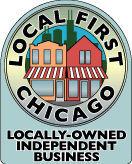- Categories:
Local First Chicago: Maintaining Local Flavor, One Neighborhood at a Time
 Chicago is not just a big city: it's a conglomeration of neighborhoods, each with its own unique flair and style. But over the past five years, local business owners and residents have seen some Chicago neighborhoods turn over to chain stores -- and bit by bit those areas are losing their unique character.
Chicago is not just a big city: it's a conglomeration of neighborhoods, each with its own unique flair and style. But over the past five years, local business owners and residents have seen some Chicago neighborhoods turn over to chain stores -- and bit by bit those areas are losing their unique character.
"There's no reason to go [to a neighborhood] if it's just like anywhere else," said Ellen Shepard, executive director of the Andersonville (Chicago) Chamber of Commerce. "So you end up losing business." Fortunately, a number of independent businesses decided to do something to help maintain their respective neighborhoods' uniqueness. The result is Local First Chicago.
Shepard and Suzanne Keers, a Chicago-based IT professional, spearheaded the creation of Local First Chicago. Shepard and Keers were well aware that local business coalitions were springing up all over the country. More importantly, they knew that these kinds of organizations were becoming a vital conduit of information from independent business owners to consumers, providing a good platform on which to raise awareness on the value of shopping local. "We were very much aware of this national movement," Shepard said.
Local First Chicago initially launched as coalition of independent businesses from four Chicago neighborhoods: Andersonville, Lincoln Park, Lincoln Square, and Wicker Park/Bucktown, but is now growing citywide. As so often is the case with an independent coalition, among the first members were two independent bookstores, Women & Children First in the Andersonville neighborhood and The Book Cellar in Lincoln Square.
Shepard noted, "We used BALLE [Business Alliance for Local, Living Economies] as a resource." She added that the then-chair of BALLE, Laury Hammel, came to Chicago and spoke to the group about starting an independent business coalition. Local First Chicago is a chapter of BALLE.
The Local First Chicago mission statement is to "keep money and character in our neighborhoods and build a thriving local living economy. Local First Chicago works primarily through public education, business support, and advocacy."
Ann Christophersen, co-owner of Women & Children First, told BTW that her store joined Local First Chicago, because, "like Book Sense, it was an opportunity to work with other independent businesses to do joint promotions and provide education about what makes independent businesses different and what the threats are."
The Book Cellar's Susan Takacs explained, "I'm a small, independent bookstore, and I thought it was important that our neighborhood learn what it means to support the local stores in our community and the benefits they can gain." Thus far, she noted that Local First Chicago has raised awareness. "I think it has helped, but I think we can continue the process."
The ranks of Local First Chicago grew quickly, from about eight to 100 members in just a couple of months, Shepard reported. Members receive a basic Local First Campaign kit; e-mail newsletter and announcements; access to the members-only section of the group's website; their business name in Local First Chicago educational materials and a name/link on the website; free or reduced fee entrance to Local First Chicago events and meetings; and member-to-member discussion/networking.
Local First Chicago's first campaign, which kicked off in November 2005 with the slogan "Shopping in a Local Wonderland," focused on consumer awareness. "It garnered lots of media coverage," said Shepard. The group repeated the event in 2006 and will again in 2007. "The media seems to love these campaigns," she added, "so you get free media attention and every year we see more and more people [shopping locally]."
Businesses in the Andersonville neighborhood also have very specific economic data that supports their mission. In 2004, Civic Economics released "The Andersonville Study of Retail Economics," which showed that, for every $100 in consumer spending with a local firm, $73 remains in the Chicago economy; and for every $100 in consumer spending with a chain firm, $43 remains in the Chicago economy. Women & Children First participated in the study, which was commissioned by the Andersonville Development Corporation (ADC), with the support of the Andersonville Chamber of Commerce and funding by Special Service Area District No. 22.
Shepard said that it helps to have economic data that supports the mission of Local First Chicago and it's equally useful when discussing issues with local lawmakers and planners. --David Grogan

